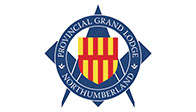Today we help the brethren of Purcell Lodge No.4236, who meet at Blyth Masonic Building, to celebrate their centenary.
Purcell Lodge had an interesting beginning. It appears that the formation of a new Lodge came about as a result of an informal conversation between friends, Bro. J McGregor and Bro. George MacDonald, during a dance at the Heaton Assembly Rooms sometime in 1920 when one remarked that he had never been to a Lodge meeting anywhere since he took his Third Degree, due to his music profession. It also emerged that he knew of other Brethren who were in the same situation as they simply were unable to attend meetings during evening hours, due to their work within the entertainment industry. As such they decided to gather together enough Founders to form the nucleus of a new daylight Lodge.
The first Founder’s Meeting was held, with 20 prospective Founders attending, on 3 September 1920, at 9 Brunswick Place, Newcastle to discuss the formation of a new ‘Matinee Lodge’. W Bro. W D Oliver, a Past Master of Novocastrian Lodge No, 3361, chaired the meeting of some 10 interested Brethren, and it was agreed that W Bro. Oliver would be the first Master of the Lodge. The Lodge was sponsored by Seymour Bell Lodge No 3635.
It is, however, interesting to note that the very first item of business proposed was quickly rejected by Grand Lodge as the Lodge wanted to hold meetings on a Sunday evening and Grand Lodge replied that under no circumstances were Lodges allowed to hold their meetings on Sundays
The next problem arose in the choice of a name for the Lodge. Among the suggestions initially put forward were Musical and Dramatic, Matinee, Purcell, and Mozart and, at a later Founder’s Meeting, the name United Arts Lodge was submitted to Provincial Grand Lodge for consideration.
This evoked an interesting objection from the Provincial Secretary, W Bro. G F Bryce who stated that the petition had been put to Grand Lodge and they objected to the name ‘United Arts Lodge’, on the grounds, that of the 38 Founders, the following professions were given, which could hardly be considered to come under such a comprehensive title as ‘United Arts’:
Coal Exporter, Boot and Shoe Dealer, Coke Inspector, Contractor, Immigration Officer, Auctioneer and Valuer, Engineers, Insurance Agent, Accountant, Compositor, Secretary, Managing Director, Electrician. Printer, Film Salesman, Cinema Managers etc.,’
The second name to be submitted, Purcell, was approved, a Lodge crest designed and a motto chosen which was ‘Non Nobis Solum Nati Sumus’ which translates into English as ‘We are not born for ourselves alone’. Both of these were approved.
Henry Purcell (1659-1695) was regarded as one of England’s greatest composers, who specialised in classical Baroque Music. As a young boy, he trained as a chorister in the Chapel Royal, and was later organist at the Chapel Royal and Westminster Abbey. Purcell composed brilliant ceremonial music for significant Royal events, such as the Coronation of James II, and William III and Queen
Mary II. He also composed music for Royal funerals and birthdays and other court occasions.
Restoration London also provided Purcell with the opportunity of providing hundreds of songs and instrumental works for the theatre, As well as his operatic masterpiece Dido and Aeneas, Purcell wrote four popular semi-operas, works which include speech, namely, Dioclesian, King Arthur, The Fairy Queen and The Indian
Queen. Henry Purcell died at the tragically early age of only 36, but he left behind him an impressive legacy which the Founders of the Lodge wished to recognise.
The Founder’s Committee met a few more times to discuss such mundane matters as subscriptions and meeting dates, and eventually, the Consecration date was fixed for 31st January 1921.
The Ceremony was carried out by the Provincial Grand Master, Colonel C..W. Napier-Clavering at the Brighton Assembly Rooms, Westgate Road, Newcastle.
The tradition that Purcell Lodge was an ‘Entertainer’s Lodge’ was certainly exemplified by the number of candidates who were members of the performing arts. During the first year, the Lodge initiated, as the first member, Roland Charles Catherall, of Ilkley, who was described as being a ‘Musician’. In rapid succession, the Lodge initiated 1 Violinist, 5 Managers, a further 8 Musicians, 1 Theatre Proprietor, 1 Master of Instruments, 1 Vocalist and 1 Director of Music,
One of the Founders was John G Windows of the Music Shop fame and by 1922 the Lodge had enough musicians to form a small orchestra or Ragtime Dance Band
Over the course of several years, the Lodge met at a few different venues including the Masonic Halls at Broomfield Avenue and Fern Avenue, but in the 1990s began to run into difficulties and was on the verge of closing. In 1996 the Lodge moved to Blyth Masonic Hall, and began to prosper again, helped by the change in meeting day to a Saturday.
Purcell Lodge, still therefore, maintains the original idea of a daytime Lodge, and in one sense, as a ‘Matinee Lodge’, for it now meets at the time when there were traditional Saturday afternoon matinees at the Theatre or Cinema.
The Lodge have produced a video to tell their story celebrating 100 years today. The digital Diamond String Orchestra helped resurrect the spirit of the original Purcell Lodge Orchestra by producing the background music.
Congratulations to the members of Purcell Lodge and we hope that you can meet again soon to celebrate this momentous occasion in person.
Thanks go to W.Bros. Brian Denton, the Secretary of Purcell Lodge, and Ian Brown, the Provincial Librarian and Archivist, for the submission of this article.
If you have a story, event or news item you would like to have published on the Provincial website, please get in touch with the Provincial Communications Team at news@northumberlandmasons.org.uk

